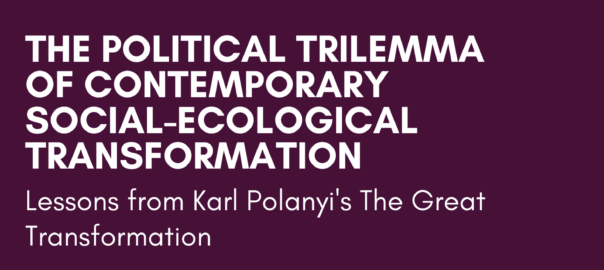
Category Archives: Events

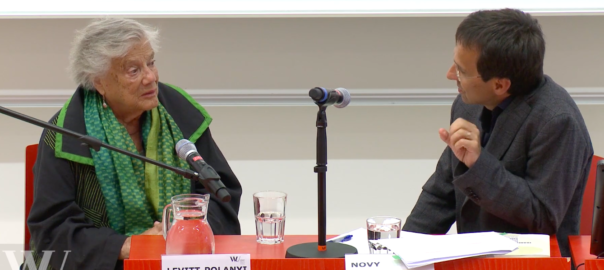
Past and Future of the Great Transformation – Talk with Kari Polanyi Levitt
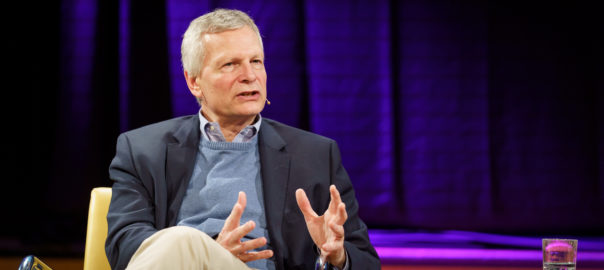
Dani Rodrik: Karl Polanyi and Globalization’s Wrong Turn
POLANYI LECTURES 2019
In April and May of 2019, the Department of Socioeconomics at WU Vienna organised the Polanyi Lectures, which were part of the framework program of the International Karl Polanyi Conference 2019. The lectures, co-organized by the Institute for Multi-Level Governance and Development, welcomed:
- Dani Rodrik, economist and Ford Foundation Professor of International Political Economy at Harvard’s John F. Kennedy School of Government,
- Jamie Peck, Canada Research Chair in Urban & Regional Political Economy, Distinguished University Scholar, and Professor of Geography at the University of British Columbia in Vancouver and
-
Marguerite Mendell, Director of the Karl Polanyi Institute of Political Economy Montreal.
In his lecture ‘Karl Polanyi and Globalization’s Wrong Turn’, Dani Rodrik argues:
“Globalization took a wrong turn when it overlooked Polanyi’s central insight that markets need to be embedded in institutions, both for effectiveness and legitimacy. The brief period of Bretton Woods-style globalization in the decades following World War II was more Polanyiesque in so far it did not question the centrality of national economic management and regulation. Constructing a viable globalization will require going back to that central insight, though the results are unlikely to look much like the Bretton Woods regime.”
You can watch the full lecture here or read the transcript of the lecture below (PDF) :
Further Links:
Dani Rodrik: Karl Polanyi and Globalization’s wrong turn – Transcript of the lecture (PDF)
Read the excerpt of Rodrik’s talk in the IWM Post, the Magazine of the Institute for Human Sciences (p. 10)
Detailed Program Polanyi Lectures (PDF)
Karl Polanyi und die falsche Wende der Globalisierung – Paulo Freire Institute Austria
(German only)
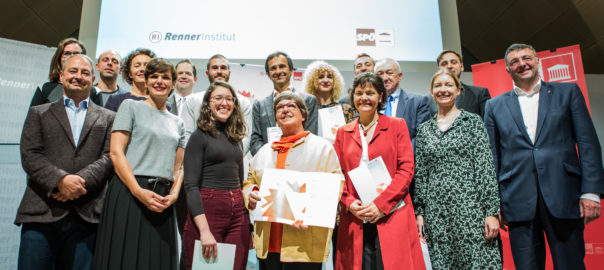
Board members of the IKPS receive Kurt-Rothschild-Preis
We are very happy to announce that our board members Brigitte Aulenbacher, Andreas Novy and Veronika Heimerl, together with Richard Bärnthaler, have received the prestigious Kurt-Rothschild-Preis for their contribution „Karl Polanyi, The Great Transformation and Contemporary Capitalism: Putting the Economy in Its Place“. Continue reading Board members of the IKPS receive Kurt-Rothschild-Preis
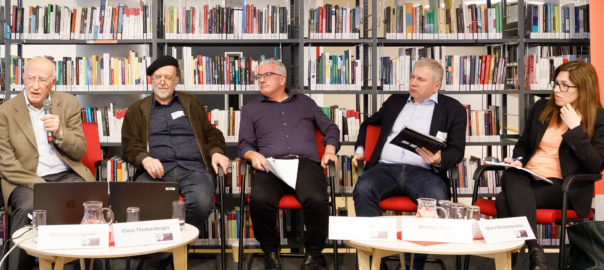
Reviewing the Karl Polanyi Conference 2019
Karl Polanyi Conference 2019:
About “zombie neoliberalism” and other challenges of the 21st century.
Marlene Eichinger. In terms of politics, the “Western world” has been disrupted by a cascade of striking events over the past months and years: 2015 is memorized as the year of a remarkable migration movement that has led to substantive disputes within Europe – be it on an international, a national or a communal level. Continue reading Reviewing the Karl Polanyi Conference 2019
Call for Papers – International Karl Polanyi Society (IKPS) Conference 2019
Conference 2019 in Budapest and Vienna co-organized by
International Karl Polanyi Society (IKPS) &
Karl Polanyi Research Center for Global Social Studies
Karl Polanyi and the Future of Humankind
2 May 2019 in Budapest, Hungary
Conference day with invited speakers
Karl Polanyi was not only a harsh critic of existing global capitalism and its historic development; he was also concerned with how humankind shapes its own destiny. The first part of the conference seeks to understand what possible futures can be envisioned in the current circumstances and dynamics of global capitalism after a long period of neoliberal hegemony.
Universal Capitalism in Decline?
3-5 May 2019 in Vienna, Austria
Conference with call for papers
Call for Papers
In 1945 Karl Polanyi published “Universal Capitalism or Regional Planning” , using the term “universal capitalism” to describe the political-economic system that had led to the Great Depression of the 1930s and World War II. The conference refers to this motive to analyze contemporary societal change, to share perspectives from around the globe and to reflect on methodological questions. These three broad concerns will be at the center International Karl Polanyi Society (IKPS) conference 2019.
A) Globalization, financialization, liberalization and the countermovement
“Universal capitalism” describes a series of processes familiar to us today. Neoliberal globalization, financialization and commodification universalize the market society and increase socio-cultural tensions. These globalizing dynamics have resulted in diverse anti- globalization movements, but might even have nurtured the spread of authoritarian regimes. The respective imaginaries of these movements against neoliberal globalization range from nostalgia of a lost past to visions of a commonwealth based on solidarity and equality. Karl Polanyi’s oeuvre provides us with a unique analytical framework, concepts and ideas to study these processes, crises, and transformations. Current movements should be examined from different perspectives, including:
- Disentangling the relationship between free trade and finance on the one hand, national sovereignty and democracy on the other hand
- Global ecological and social challenges and regional resilience strategies
- National sovereignty, illiberal democracies and European solidarity
- Western universalism, the rise of Asia and a new world (dis-)order
- Trade wars, new forms of protectionism and the challenges for neoliberal globalization
- Civil society initiatives, labor and social movements facing neoliberal globalization and political change
B) Bringing together Polanyi-inspired research from different regions and countries
Karl Polanyi has become an indispensable point of reference in critical discussions on contemporary transformations. However, scholars in different countries and regions emphasize different aspects of his work. We invite papers that focus on how Polanyi’s analyses of universal capitalism and its transformations are discussed in different parts of the world.
C) Commodification, double movement and embeddedness – concepts to understand the 21st century capitalism?
”Working with Polanyi today” means reflecting, thinking and acting under the conditions of fragmented, increasingly international academic communities in a neoliberal, more and more authoritarian environment. Polanyi, however, has always gone beyond academia, making his living as a journalist, teaching at public universities and contributing to public debates. The question of how social science can contribute to the elaboration of a democratic narrative for the ordinary people occupied Polanyi throughout his life. Therefore, we explicitly invite papers that dwell on the relation between the scientific and the ethical approach as well as possible academic contributions to public debates. Of special interest are conceptual clarifications and experimentation with new forms of partnerships between civil society, social movements and academia.
Conference language: English.
Submission of Abstracts
Abstracts should not exceed a maximum of 400 words, including the author’s full name, the title of the presentation, a maximum of 4 keywords, the author’s affiliation, full address and e- mail. Please send your abstract with all the necessary information to the address: ikps@wu.ac.at, with in the subject line “Abstract Conference 2019”.
Deadline for submitting abstracts: 31 December 2018
Notification of acceptance: 31 January 2019
Presentations of the papers will be held in Vienna.
Download the Call for Papers HERE
Venues
Budapest: Corvinus University of Budapest
Vienna: Austrian Foundation for Development Research (ÖFSE)
The organizers will arrange transportation between Budapest and Vienna for those interested.
Organizers and hosts of the conference
International Karl Polanyi Society: www.karlpolanyisociety.com
Karl Polanyi Research Center for Global Social Studies: www.karlpolanyicenter.org
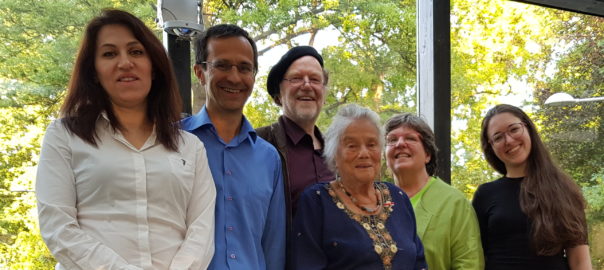
Foundation of the International Karl Polanyi Society (IKPS)
In recent years, there has been a Karl Polanyi (1886-1964) revival. Scholars all over the world are referring to his masterpiece The Great Transformation to understand and explain the development and changes of contemporary capitalism, of market fundamentalism and the rise of new reactionary forms of authoritarianism. Karl Polanyi promoted an integrated analysis of complex, conflict-laden phenomena that did not resort to dogma. Engagement with and criticism of his concepts and predictions have inspired new research fields – be it in transformation studies, socioeconomics or cultural political economy.
The International Karl Polanyi Society – founded May 8, 2018, in Vienna – will take up this intellectual legacy as well as the huge international interest. It will aim at promoting and broadening the research inspired by Karl Polanyi to understand the contradictions inherent in contemporary capitalism. In the age of the climate crisis, rising illiberal democracies, social polarization and looming geopolitical confrontation, his writings inspire us to engage with the multiple contradictions of economic growth and technological progress (“improvements”) on the one hand and threats to ecological sustainability and sociocultural well-being (“habitation”) on the other.
Presentations at the event:
- Speakers and Abstracts (PDF)
- Marguerite Mendell (Concordia University, Montreal, Canada) – Welcome address (Video in English language)
- Klaus Dörre (Friedrich-Schiller-University Jena, Germany):„Right-wing populism – a Polanyian counter-movement?“ (Slides)
- Bob Jessop & Ngai-Ling Sum (Lancaster University, United Kingdom): „Karl Polanyi as a proto-Cultural Political Economist“ (Slides)
- Brigitte Aulenbacher (Johannes Kepler University Linz, Austria): „On the future of the International Karl Polanyi Society“
- Marcus Gräser (Johannes Kepler University Linz, Austria): „Karl Polanyi and the Origins of his Time“
- Michael Brie (Rosa Luxemburg Foundation, Berlin, Germany) & Claus Thomasberger (HTW, Berlin, Germany): „Karl Polanyi and the double transformation“ (Slides)
- Maria Markantonatou (University of the Aegean, Lesvos, Greece):„Karl Polanyi and Eurozone Liberalism – the antidemocratic virus revived?“ (Slides)
- Sabine Frerichs (Vienna University of Economics and Business, Austria): „„Right-wing populism – a Polanyian counter-movement?“ (Slides)
- Ernst Langthaler & Elke Schüßler (Johannes Kepler University Linz, Austria): „Karl Polanyi and Interdisciplinary Commodity Studies“ (Slides)
- Veronika Heimerl & Hendrik Theine (Society for Plural Economics, Vienna , Austria) with Kai J. Lingnau and Ernest Aigner: „Karl Polanyi and young scholars’ perspectives“ (Slides)
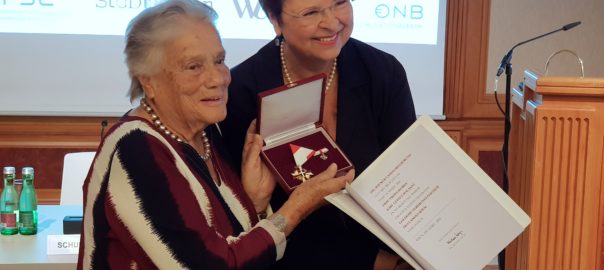
Kari Polanyi Levitt: A West Indian from Eastern Europe
Development Lecture ÖFSE – Austrian Research Foundation for International Development
Kari Polanyi Levitt, renowned Canadian development economist and daughter of Karl Polanyi, visited Vienna to participate at the foundation of the International Karl Polanyi Society in May 2018. On this occasion, she gave a lecture at the 14th ÖFSE Development Lecture on the challenges for development economics in the age of neoliberal globalization. Kari Polanyi Levitt received an award for her lifetime achievements by the City of Vienna.
Watch a recording of the whole lecture here:
Kari Polanyi was born in Vienna, where she spent most of her childhood. Her father went into exile in 1933, Kari in 1934 and her mother Ilona, an anti-fascist activist, in 1936. Many central-european intellectuals followed them into exile to Great Britain. Once arrived, they quickly became part of an innovative milieu of expatriates and the british elite, who not only changed economics through the Keynesian Revolution, but also did an important job on development politics.
Read the opening speech, held by Andreas Novy, here: